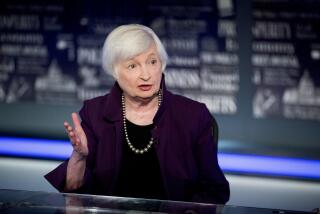Freddie Mac Gives U.S. a Case of Nerves
- Share via
WASHINGTON — Even as mortgage interest rates glided effortlessly to new lows Thursday, the nation’s economic policymakers watched nervously for signs of additional trouble at mortgage finance giant Freddie Mac. And with good reason.
If things were to go terribly wrong for the federally chartered behemoth, the results could dwarf what until now has been the government’s biggest bailout: the savings and loan collapse of the 1980s.
In the S&L; case, Washington had to protect government-guaranteed deposits totaling about $1.9 trillion in 2003 dollars. If Freddie Mac and its mortgage industry sibling, Fannie Mae, were to run into deep trouble, it’s conceivable that the government could get stuck guaranteeing nearly twice that much. That, or risk letting the firms’ problems threaten the strongest pillar of today’s shaky U.S. economy: housing.
At the moment, there appears little reason to worry. Indeed, by standards of recent corporate controversy, Freddie Mac’s problems seem downright pedestrian. The company has said it misrepresented its profit for the last three years by understating them. In virtually every other recent scandal, executives have been accused of overstating profits to drive up their companies’ stock prices, to win cushier pay packages or simply to satisfy their egos.
Still, senior government officials acknowledge having nagging doubts, in part because still so little is known about what is going on inside the company and in part because Freddie Mac seems to be a classic case of a regulator’s nightmare: an institution that’s “too big to fail.”
“This may end up being a relatively minor thing, or it may end up being far more serious,” Treasury Secretary John W. Snow warned reporters in Mexico City, where he was traveling Thursday.
Those fears were fed this week when the firm abruptly announced that three of its top executives were leaving. Among them: company President and Chief Operating Officer David Glenn, who was fired for allegedly tampering with documents in connection with an internal probe of the firm’s problems in properly reporting its profit.
Since the Monday announcement, Freddie’s and Fannie’s stocks have taken a drubbing. Freddie’s shares were down more than 20% by the end of trading Thursday; Fannie’s were off by 10%.
More important, a small but distinct gap has opened between the price of the two firms’ bonds and comparable U.S. Treasuries -- a measure of the extra compensation investors are demanding in the wake of the firms’ problems.
For Freddie, the gap means the firm has to pay about $1 million more a year for every $1 billion it borrows, said Jeffrey Given, a bond trader with John Hancock Funds in Boston.
Freddie’s and Fannie’s $3.5 trillion of outstanding debt usually trades only fractionally above Treasuries. That’s because both companies receive some special protections from the government. That leads investors to think they have the full faith and credit of the United States behind them.
Therein could lie the rub. A loss of confidence in one of the firms easily could spill over to the other, sending their borrowing costs sharply higher and damaging their status as nearly risk-less investments. Unless the government put its full faith and credit behind both, the spillover could spread much further.
What happens to Freddie and Fannie matters to average Americans even in good times. But their fates are especially important when the economy is struggling as it is now and the government is less able to take on new tasks because of mounting deficits.
The firms share a lot of the credit for making the nation’s $6.6-trillion mortgage market the smooth-running, wealth-making machine it is.
The pair, created by the government but now shareholder-owned, buy home mortgages from banks and mortgage brokers, allowing those institutions to turn around and make new loans, bolstering consumption.
The two either keep the mortgages for themselves or package them as collateral for mortgage-backed bonds.
As they have grown, the pair have helped standardize the lending process, turning what had been a fractured, localized business into an efficient, global market, thereby holding down mortgage costs for homeowners.
Arguably, Fannie and Freddie were at least part of the reason that the average 30-year fixed-rate mortgage tumbled to a record low 5.21% last week, down from 6.71% a year earlier.
By now, the two own or guarantee nearly half of all mortgages in America and about three-quarters of those mortgages to which the firms’ charters restrict them: those under $322,700.
But it is precisely their dominance of the mortgage market and the fact that rates are plunging that make the timing of Freddie’s problems so worrisome.
Because the two companies are so close to tapping out their portion of the mortgage market, it raises questions about whether Freddie, in order to keep growing, was taking risks it wouldn’t have in the past.
“If it turns out they were not managing their risk as adeptly or conservatively as people thought, that could create extremely serious credibility problems for the company and turmoil in some parts of the financial markets,” said Bert Ely, president of Ely & Co., a Virginia bank consulting firm.
Any doubts about Freddie’s or Fannie’s ability to manage could prove particularly corrosive now because of the drop in mortgage interest rates and the refinancing boom, both of which render it much more difficult for the firms to operate.
The refinancing boom in particular makes it hard for the firms to create their mortgage-backed securities because as people take out new, lower-interest mortgages they pay off their old mortgages, erasing the very collateral that is supposed to be underpinning the securities.
Analysts say there are two ways Freddie’s recent accounting and management troubles could mix with falling rates, as well as both Freddie and Fannie butting up against the limits of their markets, to produce a combustible concoction:
The Market Scenario
In a 114-page report issued in February, Freddie’s and Fannie’s government regulator, the Office of Federal Housing Enterprise Oversight, described a possible chain of events in which one of the two “suffers large losses and becomes illiquid.”
Although the report suggests ways in which financial market players could avert a full-blown crisis on their own, it also warns that doubts about the wounded firm’s ability to repay its bond debt and maintain a market for its mortgage-backed securities could spread to other firms. From there, the trouble could hit the financial sector generally.
The report concludes: “If the government does not prevent a financial crisis, the potential decline in aggregate economic activity may be very large.”
The Political Scenario
Freddie’s current troubles already have attracted the attention of lawmakers. Congressional hearings are being scheduled. Bills to limit Freddie’s and Fannie’s special treatment by links to the government already have been filed.
The problem is that many of the investors who have bought Freddie or Fannie bonds or mortgage-backed securities did so assuming those links would remain in place and that they constitute an implicit government guarantee of the securities.
Among the ties: The firms don’t have to register their financial instruments with the Securities and Exchange Commission, and they can draw on a multibillion-dollar line of credit with the Treasury. In addition, the nation’s federally insured banks are allowed to buy the firms’ bonds and securities just as they do U.S. Treasuries.
Lawmakers have no interest in setting off a financial panic, but some are eager to get out from under the obligation to protect the two giant firms. Analysts worry that if Congress eliminates one or a few of those protections, investors will begin to have doubts about all of them and will recoil from buying their securities. The result could be to precipitate a crisis.
More to Read
Inside the business of entertainment
The Wide Shot brings you news, analysis and insights on everything from streaming wars to production — and what it all means for the future.
You may occasionally receive promotional content from the Los Angeles Times.










